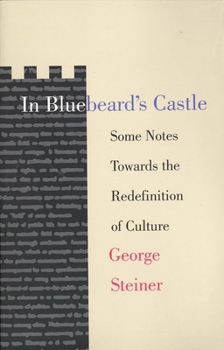In Bluebeard's Castle: Some Notes Towards the Redefinition of Culture
Select Format
Select Condition 
Book Overview
"Four impressive lectures about the culture of recent times (from the French Revolution) and the conceivable culture of times to come. Mr. Steiner's discussion of the break with the traditional... This description may be from another edition of this product.
Format:Paperback
Language:English
ISBN:0300017103
ISBN13:9780300017106
Release Date:September 1974
Publisher:Yale University Press
Length:154 Pages
Weight:0.40 lbs.
Dimensions:0.4" x 5.0" x 8.0"
Customer Reviews
3 ratings
Compulsory read to start understanding our times ?
Published by Thriftbooks.com User , 14 years ago
An extremely interesting essay by one of the -supposedly- greatest minds of the XXth century, trying to analyze the western world's culture and education system through modern history, with the events of the second world war as a turning point - with no possible way back - : how the rise of science and the "fall" of God (to briefly summarize it) during the past centuries led to the Shoah, how culture has evolved since then (the book was written in the 70s) compared to what it was before and finally how Steiner think we should proceed forward to avoid repeating mistakes of the past and handle the somewhat scary potential of the future of science. All of it wrapped in exceptional wisdom and culture while very didactic even for neophytes like myself, tainted with a light pessimism, but a pessimism that looks towards the light. Pretty damn good.
Optimal Steiner
Published by Thriftbooks.com User , 20 years ago
While reading this book I constantly had to remind myself that it was written in 1970-71, so prescient and prophetic were Steiner's insights. As a study of Western culture, an investigation into where--and what--we are historically and globally, it remains absolutely critical reading. Steiner read right what continue to be the major issues of our time: the generalized suspicions about the irrelevance of "high" culture when projected against 20th century political atrocities; the role of literacy in a progressively visual culture; the increasingly pervasive roles of various forms of music; the emerging pre-eminence of "facts," of a scientific mind-set and of scientific knowledge in general; the ethical and intellectual risks posed by the scientific unknowns--to name but a few themes in this dense, richly thought-out essay. This is a thin book, unlike "No Passion Spent"; rigorously and earnestly investigatory, unlike "Errata." Ironically I came to this book last, but it is by far the most satisfying. In the former, only one essay, "Archives of Eden," touches on the large cultural questions examined here, and then more in the form of a rant; in the latter, what had by then become Steiner's familiar terrain seemed only to have been re-rehearsed, with no substantive new insights.But here is Steiner at his least pretentious (he does have a tendency to flaunt his polylingual capacities), at his most profound and probing. It isn't easy reading and isn't intended to be. It has the earmark of a formidable mind investigating its time and space for its own sake, more out of its own curiosity and impulse to understand as of any desire to impress, or advance its host professionally. Here is Steiner at the same amplitude as an Elias Canetti or a William Irwin Thompson--an encyclopedic generalist discussing broad cultural questions with command, eloquence and erudition.
Compelling conjecture.
Published by Thriftbooks.com User , 21 years ago
A bold reflection about why the West lost her innocence by organizing the Holocaust.For the author, the motives for the Holocaust lie in the subconscious and more particularly in the psychology of religion.First, Moses gave us monotheism with an abstract, ruthless, almighty but absent God. Secondly, his son Christ, required in his Sermon of the Mount total self abandonment. Thirdly, there was the Messianic socialism of Marx, Trotski and Bloch.The West took revenge by exterminating the people who saddled its subconscious with these inhuman utopian dreams.The West lost her innocence; but how can it react against the committed barbarism: by the stoicism of a Freud, or by the cheerfulness of Nietzsche for the fact that we are only a few moments here on this gruesome planet.This powerful text forces the reader to a serious reflection. I don't have any clinical psychoanalytical material at my disposal that confirms or denies the author's conjectures. So suggestions for other work in this field are very wellcome. For me, this book is certainly not the whole truth, as there were among others, resentment for success, the search for a scapegoat for the economic depression or the more than ambivalent attitude of the Catholic Church.




